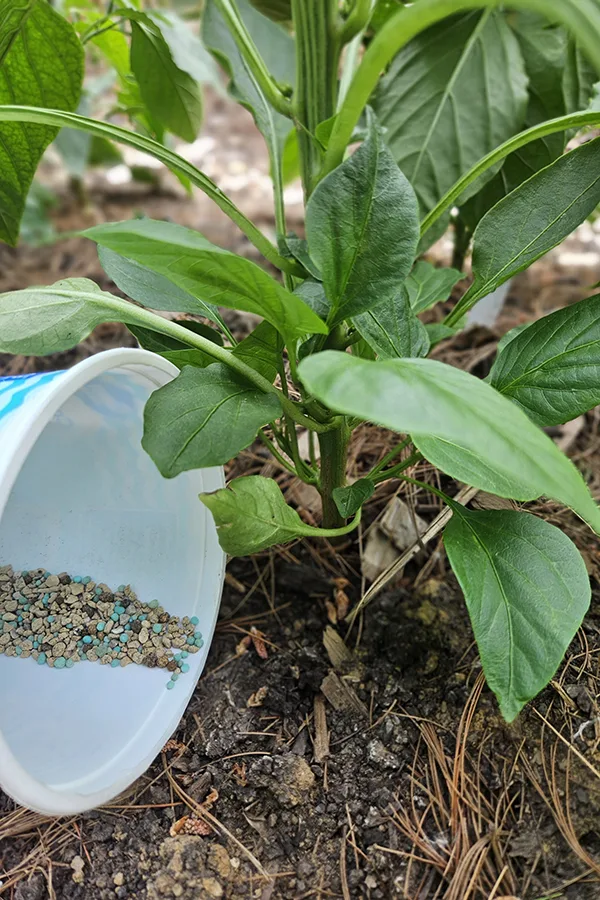Selecting the Best Fertilizers for Peppers: Professional Recommendations
Selecting the Best Fertilizers for Peppers: Professional Recommendations
Blog Article
Organic Vs. Synthetic Fertilizers: Which Is Best for Supporting Healthy And Balanced Pepper Plants?
In the world of nurturing healthy and balanced pepper plants, the option between artificial and organic plant foods stands as an essential decision with far-ranging effects. While both options purpose to provide crucial nutrients to sustain plant growth, the subtleties of their effect on the dirt, plant health, and the environment trigger an argument that echoes throughout the horticulture neighborhood. Comprehending the distinct benefits and prospective pitfalls of each fertilizer kind is important for pepper growers looking for to enhance their returns while preserving an eco-conscious and lasting method.
Benefits of Organic Plant Foods
Organic fertilizers use an environmentally-friendly and sustainable strategy to nourishing pepper plants, providing crucial nutrients without the usage of synthetic chemicals. These all-natural fertilizers are derived from natural sources such as garden compost, manure, bone meal, and algae, promoting dirt health and wellness and biodiversity. Unlike synthetic plant foods, organic choices launch nutrients slowly, ensuring a consistent and balanced supply for pepper plants to grow.
One considerable advantage of organic plant foods is their ability to enhance dirt structure and water retention. By improving dirt health and wellness, natural fertilizers promote beneficial microbial task, which aids in nutrient uptake by pepper plants. Additionally, natural fertilizers minimize the threat of chemical run-off, safeguarding water resources from pollution and guarding the environment.
Furthermore, organic plant foods add to long-lasting dirt fertility by advertising the growth of advantageous soil organisms. These microorganisms aid break down organic issue, launching nutrients in a kind that is quickly available to pepper plants. best fertilizers for peppers. By cultivating a healthy dirt ecological community, organic plant foods sustain sustainable pepper farming methods that profit both plants and the atmosphere
Drawbacks of Synthetic Fertilizers
Synthetic plant foods, in contrast to their natural counterparts, present different drawbacks when used to nurture pepper plants, influencing both plant health and wellness and environmental sustainability. One significant downside of synthetic plant foods is their propensity to seep nutrients from the dirt rapidly.
Moreover, the overuse of artificial fertilizers can contribute to water air pollution. Excess fertilizers not absorbed by plants can clean away into water bodies, leading to eutrophication, where algae blooms diminish oxygen levels in the water, harming water life. Additionally, artificial plant foods are generally acquired from non-renewable resources, such as fossil fuels, adding to carbon discharges and environmental deterioration during their manufacturing.
Nutrient Absorption Comparison
When comparing natural and synthetic plant foods in terms of nutrient absorption, natural plant foods have the benefit of providing a more balanced and slow-release source of nutrients. Organic fertilizers consist of a selection of macro and trace elements that are not only advantageous for the plants however likewise advertise healthy and balanced dirt microbial task, which assists in nutrient uptake.
Furthermore, organic fertilizers boost dirt framework and water retention ability, permitting pepper plants to access nutrients much more effectively. This enhanced dirt high quality assists in origin development, enabling better nutrient absorption. Synthetic fertilizers, although at first enhancing plant development as a result of their high nutrient focus, may hinder long-term nutrient absorption by degrading soil wellness gradually.
Ecological Effect Considerations

On the various other hand, artificial fertilizers, although usually more concentrated and promptly available to plants, can have destructive impacts on the environment otherwise applied effectively (best fertilizers for peppers). Their production calls for high energy inputs, bring about greenhouse gas discharges and adding to environment change. Additionally, the runoff of excess artificial fertilizers can infect water sources, bring about eutrophication and hurting marine ecological communities.
Ideal Fertilizer Practices for Peppers
When fertilizing pepper plants, maximizing nutrient uptake and go to this website minimizing environmental influence are key considerations. To accomplish this, it is vital to follow finest fertilizer methods customized to the details needs of pepper plants. One important method is to perform a soil test before applying any type of fertilizers. This test can figure out the pH degree of the dirt and recognize any kind of nutrient shortages, guiding you in selecting one of the most suitable fertilizer formulation.
An additional vital technique is to feed pepper plants at the appropriate time. Commonly, peppers take advantage of getting fertilizer at planting and after that once more when they begin to flower. Over-fertilizing can result in nutrient imbalances and harm the plants, so it is essential to follow advised application prices.
In addition, selecting a well balanced fertilizer with an NPK ratio that matches pepper plants' needs is essential. Organic fertilizers, such as compost or manure, can be superb selections as they release nutrients slowly and boost soil structure with time. Synthetic fertilizers can give a quick nutrient boost when required. Eventually, combining natural and synthetic plant foods carefully can help support healthy pepper plants while decreasing environmental influence.
Final Thought

Organic fertilizers use an environmentally-friendly and sustainable technique to nourishing pepper plants, offering crucial nutrients without the use of synthetic chemicals. Unlike artificial fertilizers, organic alternatives launch nutrients slowly, making reference sure a constant and balanced supply for pepper plants to grow.
Synthetic fertilizers, in comparison to their natural equivalents, position different web disadvantages when utilized to nurture pepper plants, influencing both plant health and environmental sustainability. When comparing artificial and natural fertilizers in terms of nutrient absorption, organic plant foods have the benefit of providing a more balanced and slow-release source of nutrients.In addition, natural fertilizers enhance soil structure and water retention capability, enabling pepper plants to accessibility nutrients extra successfully.
Report this page